Posts by worldrelief
COVID and the Issues: Health
Women, men, children and entire communities across the globe have been dramatically impacted by COVID-19. In order to stop the spread of the virus, businesses, land and air transport, as well as essential services, have been forced to lock down.
Without the ability to continue treatment and a six-month disruption in access to antiretrovirals, AIDS-related deaths could double in sub-Saharan Africa in 2020 alone.
80 million children are at risk for contracting preventable diseases because immunization services at many health centers have slowed or stopped.
Essential maternal and child health interventions are being reduced and could result in maternal mortality rising from 8% to 38% and children under 5 mortality from 9.8% to 44.7%.
With no access to these life-saving health services, COVID-19 could undo years of progress. Today, in the third of our six-week series, COVID and the Issues, we’re talking with Allison Flynn, World Relief’s Senior Health & Nutrition Program Advisor. Allison gives an overview of our health and nutrition programs and sheds light on the vital importance of creating and providing access to health care and information to individuals and communities, especially in the midst of a pandemic when the normal channels of access are closed.
Come back next week to learn more about how COVID-19 is affecting our US programs. And to join us as we fight back against the residual effects of COVID-19, visit worldrelief.org/covid-19.

Dana North serves as the Marketing Manager at World Relief. With a background in graphic design and advertising and experiences in community development and transformation, Dana seeks to use the power of words and action to help create a better world. Dana is especially passionate about seeking justice for women and girls around the world.
COVID and the Issues: Child Development and Protection
It is estimated that 85 million more girls and boys may have been exposed to either physical, sexual or emotional violence as a result of COVID-19, and as many as 30 million children’s lives are in danger of secondary health impacts such as exposure to deadly diseases like malaria, lack of immunizations and malnutrition as health systems are overwhelmed by COVID-19 patients. What’s more, millions more children are at increased risk of child marriage and child labor over the coming years as family livelihoods evaporate, pushing families to identify other forms of income that harm children.
Though the numbers are staggering, there is something we can do to reduce the number of children exposed to violence and ensure their communities are places where children can thrive.
Today, in the second of our six-week series, Covid and the Issues, we’re talking with Krystel Porter, World Relief’s Program Advisor for Child Development and Protection from International Programs. Listen as Krystel shares more about how our child development and protection programming is equipping communities to serve, protect and raise healthy, thriving children, even in the midst of a pandemic.
Come back next week to learn more about how COVID-19 is affecting food security worldwide and what we’re doing to help. And to join us as we fight back against the residual effects of COVID-19, visit worldrelief.org/covid-19.

Rachel Clair serves as a Content Writer at World Relief. With a background in creative writing and children’s ministry, she is passionate about helping people of all ages think creatively and love God with their hearts, souls and minds.
The Path to Lasting Change
Change isn’t easy, and it isn’t fast. Change shows up day after day, month after month, year after year. The path to change requires faithfulness, consistency and a commitment to going the distance — no matter how far or how long it takes.
I remember the day our team pulled up to the abandoned factory on the western shore of Lake Turkana. Eight hours of driving off-road through rock, sand and empty riverbeds had left our team sore and tired, yet the sight of the looming, disheveled building was enough to shake us from our weariness.
Following the Sahelian drought of the mid-1980s, massive famine devastated the Turkana region. As is so often the case with large-scale global disasters, the initial compassion surge propelled aid rapidly into the region. International organizations set up food distributions, medical teams flew in to staff temporary feeding clinics and the Turkana people were once again shown that when things get just bad enough, Western forces will undoubtedly swoop in to save the day.
Now, blocking the blistering rays of the afternoon sun from our faces, stood one of these examples. Twenty years and 150 million U.S. dollars later, a fishery had been completed for the people of Turkana. Its promise? To prevent the people of the region from ever facing starvation again. The reality? A tragic landmark of good intentions gone wrong. The people of Turkana, you see, do not eat fish.
In 2010, African economist Dambisa Moyo wrote in her book, Dead Aid, “Africa is addicted to aid. For the past sixty years, it has been fed aid. Like any addict it needs and depends on its regular fix, finding it hard, if not impossible, to contemplate existence in an aid-less world. In Africa, the West has found its perfect client to deal to.”
These words, though difficult to hear, echo all too true for many development practitioners who frequently hear petitions for food and money when first entering new communities. The fishery in Turkana is a tangible manifestation of Moyo’s claim. It seems that every year we hear horror stories of time and money poured into well-meaning aid interventions that fail to solve the problems they intended to, create damaging patterns of dependency or, worst of all, create bigger problems for their intended beneficiaries.
These well-intentioned interventions can leave those of us that long to see lasting change take root feeling overwhelmed, perplexed and even defeated. Is there a solution? Is it possible to help without creating dependencies? Is there truly a way to bring flourishing to communities across the globe?
While stories like this one from Turkana are tragic, they’ve taught us important lessons.
In fact, they are a central part of how World Relief has developed our model of relief and development because they’ve helped us understand that lasting change comes not with quick fixes or band-aid solutions, but through a deep understanding of the unique beliefs, cultural traditions, resources and needs of the communities in which we work.
It means that in places like northern Turkana, we understand that this nomadic, pastoralist community survives on a diet of meat, milk, and blood, and that asking them to eat fish – a species they believe are directly related to snakes and associate with danger – is not a quick fix, even in cases of famine.
When seeking to fight against famine in the region, we worked closely with local churches and leaders to brainstorm creative solutions to combating malnutrition amongst the Turkana population. Today, we run a robust agricultural program in the region that helps expand and diversify the Turkana diet beyond traditional food sources, as well as teach desert farming techniques to help conserve water. We’re also breeding drought-resistant goats that can survive for longer periods of time without water when drought strikes, providing a prolonged food source for the people of Turkana.
Grassroots interventions like the ones in Turkana not only honor local knowledge, culture and community resources, but they also pave the way to break the cycle of Western aid that disempowers so many communities in the developing world.
It’s also precisely why, when we first enter communities, we begin by bringing local churches together to discuss the ways in which they can work together to solve their own problems. In fact, local pastors, community leaders and a global network of over 95,000 local volunteers are responsible for the implementation of our programs around the world. Our international staff, 95% of whom are local to the communities in which they work, have an inside voice and understanding that no outside organization can bring. What’s more, they will remain in their communities long after we depart — creating, leading and sustaining community efforts toward change.
Over the last six months, it has become apparent that the quick fixes and bandaid solutions our nation and our world have often gravitated toward are no longer working. The COVID-19 pandemic coupled with continued systemic racial injustices in the U.S. have shed light on the truth that problems must be faced at the root and lasting solutions cannot be rushed. It takes time, attention and intention to forge the path to lasting change, no matter what issue you’re trying to address.
At World Relief, we’re embracing this approach as we tackle some of the world’s biggest problems — disasters, extreme poverty, violence, oppression and mass displacement. We are devoted to addressing the root causes of these issues with locally-driven, sustainable solutions that ensure transformation remains long after World Relief is gone. Yes, this approach takes time. Yes, it is difficult to measure. Yes, in our culture of immediate gratification, it is hard. But we know this approach works. And we want you to join us in it.
Will you join us as we forge the path to lasting change?
Trump administration admitting fewer persecuted Christian refugees
A Christian woman in northern Iraq cries as she surveys the damage at her church, which was attacked by Islamic State fighters in 2016. (Hussein Malla/AP) // The Washington Post
By Carol Morello for The Washington Post
The number of Christian refugees admitted to the United States after fleeing persecution in their native countries has plummeted 90 percent since 2015, according to a report released Friday by two Christian advocacy groups.
World Relief Announces New Monthly Giving Opportunity, The Path
***FOR IMMEDIATE RELEASE***
July 14, 2020
CONTACT:
Lauren Carl
lauren.carl@pinkston.co
(703) 388-6734
BALTIMORE – Today, World Relief, a global humanitarian organization that brings sustainable solutions to alleviate poverty and respond to disasters worldwide, announced the launch of The Path, its monthly giving product designed to help individuals sustainably give to create lasting change in our world.
The Path is a community of people who are dedicated to investing in long-lasting transformation in our world. By joining The Path, donors gain access to exclusive updates to better understand the problems facing our world and to learn how we can be part of the solution, together. Donors will receive stories of hope and compelling impact reports that prove how their commitment to the journey has transformed the lives of the most vulnerable. Joining The Path connects donors to World Relief’s staff, volunteers, and beneficiaries all over the world through virtual events, prayer chains, and social media.
“The brokenness of our world today can be overwhelming, confusing and leave us at a loss for what next steps we can take to play a part in fixing it,” said Tim Breene, World Relief CEO. “We created the Path to build a community of generous givers who sustainably support our work and empower us to continue working to break the endless cycle of suffering. We hope Christians and compassionate individuals will join us in forging a path forward toward lasting change that brings hope, healing and restoration to the vulnerable.”
World Relief’s generous donors have already stepped up in incredible ways during the COVID-19 pandemic. Over the course of March through June of the COVID-19 pandemic, World Relief has seen an average monthly donation increase of 297.81%, relative to corresponding months in previous years, with the highest peak in April at 454.26%. Though the public health crises have created dire scenarios for many Americans, World Relief donors see this challenge as an opportunity to step in and provide support for others during hardship.
“World Relief has been partnering with generous givers to end extreme poverty and protect the most vulnerable around the globe for over 75 years,” said Scott Arbeiter, president of World Relief. “If we’ve learned anything, it’s that the fight for lasting change isn’t just a moment — it’s a movement. We’re excited to see how our partners’ monthly gifts become a powerful tool in the fight for lasting change.”
The Path community will help World Relief respond to urgent needs by mobilizing our global network of churches and local volunteers. In the aftermath of natural disasters and crises like the COVID-19 pandemic, World Relief provides emergency humanitarian aid including cash assistance, food & water, shelter, and psychosocial support to those in need. Our life-changing programs address the whole person – economically, physically, socially, and spiritually – to create long-term stability in areas around the world. In partnership with local churches and community leaders, World Relief works alongside local volunteers to capitalize on their inherent strengths and resources in each community to create sustainable solutions that address their unique needs.
To learn more about joining The Path, visit www.worldrelief.org/thepath/.
Download a PDF of this press release here.
###
About World Relief
World Relief is a global Christian humanitarian organization that brings sustainable solutions to the world’s greatest problems – disasters, extreme poverty, violence, oppression, and mass displacement. For over 75 years, we’ve partnered with churches and community leaders in the U.S. and abroad to bring hope, healing and transformation to the most vulnerable.
Learn more at worldrelief.org.
In Light of Ongoing Violence and Food Insecurities in Sudan, World Relief Gives Aid to Thousands in Need
***FOR IMMEDIATE RELEASE***
July 14, 2020
CONTACT:
Lauren Carl
lauren.carl@pinkston.co
(703) 388-6734
World Relief Sudan Received $4.8 million from Sudan Humanitarian Fund in 2019 to Respond to Humanitarian Crisis in Sudan
BALTIMORE – World Relief, a global humanitarian organization that brings sustainable solutions to alleviate poverty and respond to disasters worldwide, is proud to announce that World Relief Sudan earned the largest amount of funding from the Sudan Humanitarian Fund (SHF) of $4.8 million in 2019. This funding enabled World Relief to provide urgent aid to the estimated 6.9 million people that, according to the U.S. Agency for International Development (USAID), faced food insecurity during the lean 2019 season. Flooding and violence impede trade and cultivation, putting millions at risk for malnutrition and stunted growth. World Relief continues to invest in sustainable solutions that meet immediate needs while working to build long-term food security.
The SHF is a multi-donor pooled fund established in 2006, which allows humanitarian organizations early and fast response to some of the greatest needs across Sudan. The SHF has been funding World Relief’s projects in Sudan for many years, increasing from of $200,000 total funds in 2015 to $4.8 million in 2019. This past year, World Relief Sudan reached 428,160 beneficiaries in seven localities of West and Central Darfur from the SHF funding alone. The resulting programming includes Health, Nutrition, Food Security and Livelihoods, and Protection.
“The incremental growth of SHF funding is a result of World Relief’s strong presence in the field, our active participation in sectoral coordination meetings which improve our project implementation, and our compliance with all donor requirements,” explains Gemta Birhanu, Sudan Country Director at World Relief. “The World Relief Sudan team’s commitment in the field and improved capacity to deliver project deliverables within the project scope, time, and budget resulted in increased donor trust to fund the organization.”
Since 2004, World Relief Sudan has been on the ground, working to alleviate poverty and stabilize conflict. For decades, Sudan’s westernmost region of Darfur has been troubled by armed conflict. The country’s poverty levels are highest in Darfur, with almost two-thirds of the population falling below the poverty line. Human development indicators are among the worst in Africa. The delivery of essential services like health, nutrition, education and water have been severely compromised, not just by the conflict but by the limited human and financial resources available to the region.
“We are proud of World Relief Sudan’s accomplishment and for its commitment to serve the people of Sudan,” said Myal Greene, Senior Vice President of International Programs at World Relief. “This funding is very significant, as it shows great trust in the work that World Relief Sudan is doing in the field. We hope to continue growing our programming and ability to serve the people of Sudan in the upcoming years.”
To learn more about World Relief Sudan, visit here.
Download a PDF version of this press release here.
###
About World Relief
World Relief is a global Christian humanitarian organization that brings sustainable solutions to the world’s greatest problems – disasters, extreme poverty, violence, oppression, and mass displacement. For over 75 years, we’ve partnered with churches and community leaders in the U.S. and abroad to bring hope, healing and transformation to the most vulnerable.
Learn more at worldrelief.org.
Startling New Report Reveals 90% Reduction in Christian Refugee Resettlement from Countries with Persecution
***FOR IMMEDIATE RELEASE***
July 10, 2020
CONTACT:
Madeline Ingram
madeline.ingram@pinkston.co
(571) 326-3090
Paige Collins
OpenDoors@iconmediagroup.com
(615) 934-4162
Leaders of the country’s largest Christian traditions respond with alarm as World Relief and Open Doors USA release “Closed Doors” report on religious freedom impact of changes to immigration and asylum policy
BALTIMORE – World Relief, a global Christian humanitarian organization that serves refugees and other displaced people, and Open Doors USA, an international religious freedom watchdog group, published a joint report revealing a surprising 90% reduction since 2015 in the number of Christians resettled from countries where the church faces persecution. Resettlement for other religious minorities — Jewish refugees from Iran, Yezidi refugees from Iraq, Muslim refugees from Burma and others — are all also on track to end 2020 down more than 90% from 2015.
The report drew responses from leaders within the largest streams of American Christianity, including from the National Association of Evangelicals, the Southern Baptist Convention and the U.S. Conference of Catholic Bishops, institutions which represent more than 90,000 congregations in the United States.
“As Christians, we’re concerned about the wellbeing of all people who have faced persecution, including the many who are persecuted for their Christian faith,” said Scott Arbeiter, president of World Relief. “While we can and should do all we can to advance religious liberty abroad, we must also continue to offer refuge to those who have felt they had no choice but to flee. We must not close our nation’s doors on the persecuted.”
These saddening numbers are the consequence of major changes to our nation’s historical approach to refugee resettlement. Last November, the refugee cap was reduced to 18,000 – the lowest level in U.S. history. Of these slots, 5,000 are reserved for those whose designation as a refugee is based on their religious tradition.
Data from prior years demonstrates that these policy changes do not result from a lack of administrative capacity. In 2015, the U.S. admitted more than 18,000 Christians from the 50 countries on the Open Doors USA 2020 World Watch List for the persecution of Christians. Midway through this year, we have admitted fewer than 950.
“The global reality is that more people than ever before are facing discrimination, violence, and even death because of their choice to practice their faith. Religious persecution is not an isolated problem: it overlaps with an array of issues that together impact Christians,” said Open Doors USA CEO David Curry.
The report also draws attention to the harm that new proposed asylum regulations would have on the ability for persecuted Christians and others persecuted for their faith to receive asylum in the U.S.
“Our intent is to recognize, prevent, and address these issues by engaging on each point at which religious minorities are suffering. We’re glad to partner with World Relief in calling on people of faith in the U.S. to support and advocate for their brothers and sisters in every country so that we do not see their suffering magnified in our own backyard,” Curry said.
“In their shocking report ‘Closed Doors: Persecuted Christians and the U.S. Refugee Resettlement and Asylum Processes,’ World Relief and Open Doors USA document the tragic persecution of Christians whose only crime is belief in Jesus,” said Walter Kim, president of the National Association of Evangelicals. “Even more shocking is the revelation that the United States, long a beacon of hope for those fleeing religious persecution, has closed its doors to virtually everyone seeking our protection, including persecuted Christians. We must change this policy and remain a leader for religious freedom.”
“We are living in what St. John Paul II called a ‘new age of martyrdom’, where many worldwide face persecution for their faith,” said Bishop Mario E. Dorsonville, auxiliary bishop of Washington and Chairman of the U.S. Conference of Catholic Bishops’ Committee on Migration. “As this report documents, there are dramatic decreases in the ability of those fleeing for their lives to access protection. I pray our nation will reverse course and once again stand with refugees and asylum seekers, including those escaping religious persecution. Catholic and evangelical leaders have formally asked the Administration to consider refugees fleeing persecution at this time.”
Dr. Russell Moore, president of the Ethics & Religious Liberty Commission of the Southern Baptist Convention, the nation’s largest Protestant denomination, added: “As Christians, we recognize the pain of persecuted people fleeing for their lives. From our ancestors in Egypt to our Lord Jesus himself to many of our brothers and sisters around the world right now, this is part of our story. And as Americans, we recognize our country’s history of providing a safe harbor for those yearning to breathe free. In recent years, changes in our country’s refugee policies have had negative consequences for many looking to the United States for help. This report details how these matters affect persecuted Christians, and other religious minorities, in need of our aid. We should pay careful attention to these findings. As Americans, we should live up to our history. And, as the church, we should recommit ourselves to ministering to all of those in our communities, and around the world, who are fearful for their very lives.”
The report encourages American Christians to both pray and advocate for those persecuted for their faith. They echo calls from the U.S. Commission on International Religious Freedom to restore the level of refugee resettlement to the historical norm of 95,000 refugees per year. They also invite Christians to voice concerns about proposed new asylum regulations that, if finalized after the completion of a 30-day public comment period that ends on July 15, 2020, would significantly restrict asylum eligibility for persecuted Christians and others.
For more information about the report click here.
Download the PDF version of this press release.
###
About World Relief:
World Relief is a global Christian humanitarian organization that seeks to overcome violence, poverty and injustice. Through love in action, we bring hope, healing and restoration to millions of the world’s most vulnerable women, men and children through vital and sustainable programs in disaster response, health and child development, economic development and peacebuilding, as well as refugee and immigration services in the U.S. For 75 years, we’ve partnered with churches and communities, currently across more than 20 countries, to provide relief from suffering and help people rebuild their lives.
Learn more at worldrelief.org.
About Open Doors USA:
For more than 60 years, Open Doors USA has worked in the world’s most
oppressive and restrictive countries for Christians. Open Doors works to equip
and encourage Christians living in dangerous circumstances with the threat of
persecution and equips the Western church to advocate for the persecuted.
Christians are one of the most persecuted religious groups in the world and are
oppressed in at least 60 countries.
For more information, visit OpenDoorsUSA.org.
COVID and the Issues: Economic Development
We know many of you are concerned about how World Relief’s programs and the vulnerable people we serve around the world have been impacted by COVID-19. It’s been reported that 500 million more people could be pushed into extreme poverty as a result of the coronavirus pandemic.
In the first of our six-week video series, COVID and the Issues, we talk with Courtney Purvis, World Relief’s Senior Program Advisor for the Savings for Life program. Watch as Courtney provides an overview of our savings group program and explains how this program is helping people weather the economic upheaval caused by the pandemic. We promise you will learn a lot, and we hope you feel inspired by the amazing work your continued gifts and partnership will make possible.
Come back next week to hear how COVID-19 is affecting children around the world and how our Child Development and Protection programming is adapting. To learn more about partnering with us as we address the COVID-19 pandemic and its effects on vulnerable people across the globe visit worldrelief.org/covid-19.

Mary Milano serves as the Director of Fundraising Content at World Relief.
COVID and the Issues
It’s been five months since World Relief first began responding to the COVID-19 pandemic. Our U.S. and International offices closed their physical office locations in March, and our teams began innovating new ways to continue serving the most vulnerable in the U.S. and across the globe.
In the coming weeks, we will be sitting down with leaders and program experts from across World Relief’s program areas to bring you an in-depth look at how our U.S. and international teams have adapted to serving their communities throughout this global pandemic. You’ll hear more on the issues of economic development, child development, health, gender-based violence, immigration, food security and nutrition.
To kick off this new series, we wanted to give you a bird’s eye view of the work that’s been happening over the last few months and why your continued partnership in response to the coronavirus is so vital.
The vulnerable populations we serve across the globe are the most at risk of increased hunger, poverty and violence as a result of the social and economic effects of the COVID-19 pandemic. In the coming weeks, the number of people struggling with life-threatening hunger could double, and 500 million more people could be pushed into extreme poverty. Continuing our international development activities is essential as this pandemic evolves.
Hear more from Myal Greene, SVP of International Programs at World Relief.
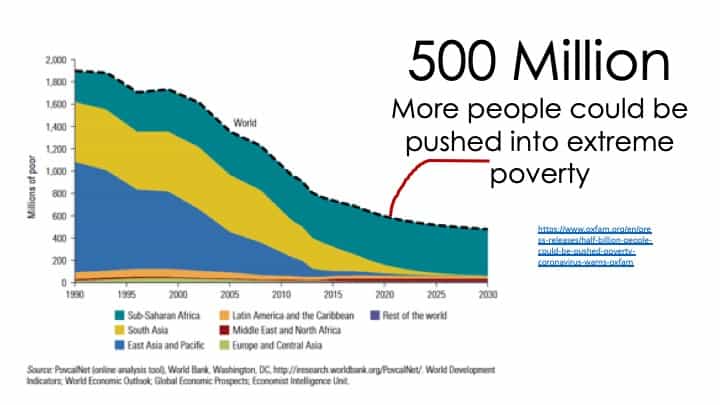
Just like in the U.S., it is now suggested that people wear cloth masks in many of the countries where we work. Our international teams and church partners are working hard to ensure the most vulnerable have access to face masks. Additionally, our teams are adapting their programs and utilizing their vast networks to make sure people have access to vital programs and services.
Hear more from Joanna Kretzer Chun, Director of Program Resources Team.
Listen as Joanna talks about how our international teams are utilizing their networks of church partners to reach thousands of people with important COVID-19 health information.
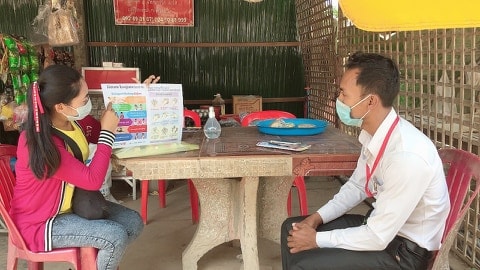
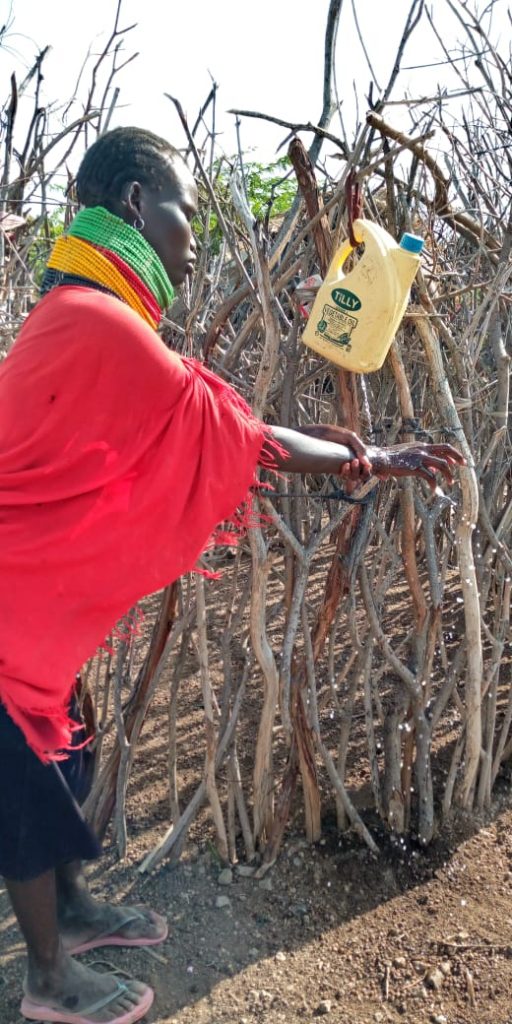
Disseminating accurate COVID-19 awareness and prevention messaging has been a key part of World Relief’s international response. Many of our teams have utilized text messaging platforms to reach hundreds of church leaders with clear and accurate information. In order to reach those living in more remote areas, our teams have had to get creative, using billboards, loudspeakers and radio stations to spread messages.
Hear more from Rhona Murungi, Senior Program Officer and International Operations Director.
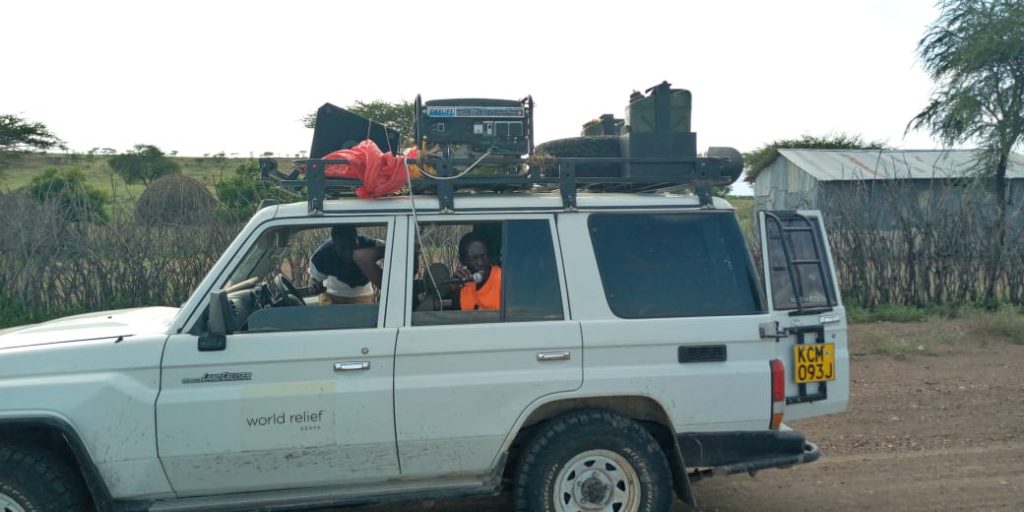
Listen as Rhona talks about the vital role that local churches are playing in reducing the spread of COVID-19.
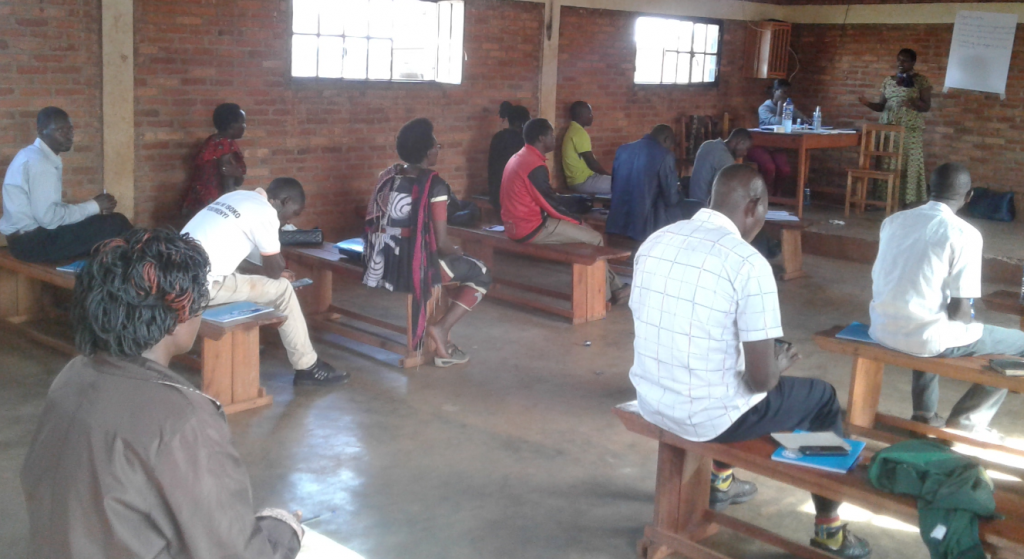
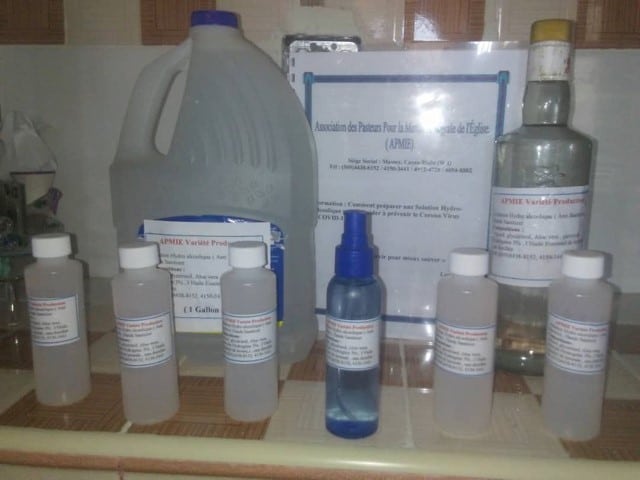
The negative effects of COVID-19 will be wide-reaching. The World Food Program has forecasted a famine of biblical proportions. The number of people facing life-threatening hunger could double in the coming months. Ensuring that affected communities have access to food has been a critical part of our international response.
Hear more from Charles Franzen, Humanitarian and Disaster Response Director.
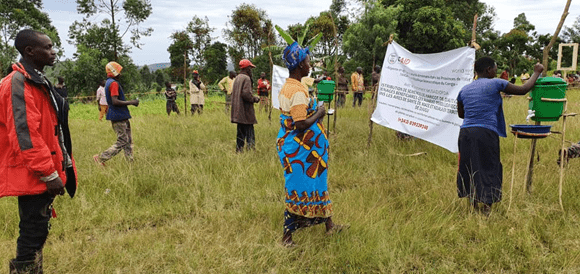
The effects of COVID-19 continue to impact our U.S. teams as well. Many of the immigrants we serve work in industries that have been hardest hit by layoffs and the economic downturn, and our teams are working hard to provide additional services to them during this time of need.
Likewise, with social distancing measures still in place in many states, our teams have continued to innovate by offering many of our programs online. Recently, two of our U.S. office directors wrote about the changes their teams made in order to keep serving immigrants in the U.S.
Read more from Tami McLaughlin, Director of World Relief Fox Valley, and Laura Fontaine, Director of World Relief Quad Cities.
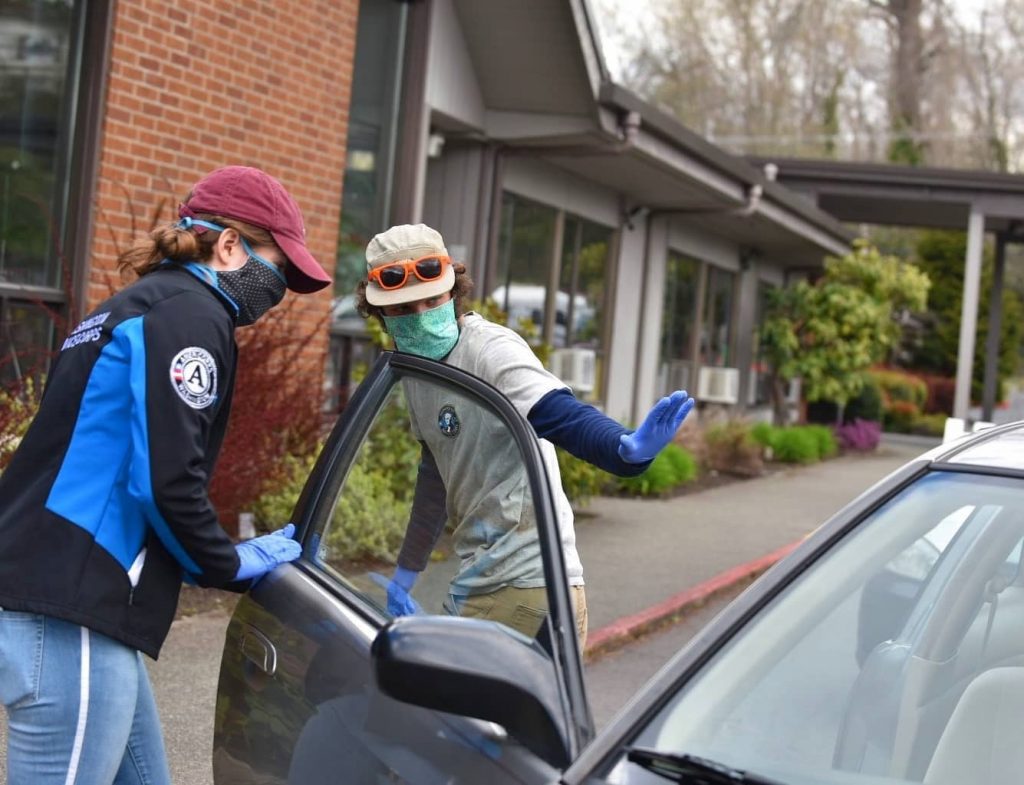

Rachel Clair serves as a Content Writer at World Relief. With a background in creative writing and children’s ministry, she is passionate about helping people of all ages think creatively and love God with their hearts, souls and minds.
I am a Dreamer
I vividly remember June 15, 2012. It was my little sister’s graduation from the University of California, Irvine, and we were getting ready for her big day. The TV was on in the background, playing either Telemundo or Univision. I can’t quite remember which. When the president came on the TV, we all stopped what we were doing to listen as he announced the DACA executive order. Incredulous, yet overjoyed, we all hugged each other!
I came to the U.S. with my family when I was 14 years old. My parents and younger siblings had received their green cards earlier that year through a family petition that was filed in 2001. I aged out of the process and remained undocumented. Getting the news that I could now receive a work permit and protection from deportation filled me with hope. I felt less abandoned. I was given the opportunity to occupy the spaces that were open to my family members as legal residents.
For weeks, I anxiously waited for the DACA forms to become available, checking uscis.gov every chance I got. Once the forms were finally available, I filed my own DACA application. I googled DREAMer blogs, which helped me put together 100+ pages of evidence that demonstrated my continuous presence in the US from 2007 to 2012. Unlike younger applicants, I couldn’t just submit my school transcripts. I graduated from college in 2007 and had worked multiple jobs between then and DACA day 2012. Those jobs ranged from tutoring, babysitting, helping the family business and volunteering at local schools. I had to provide documentation of all these things and more with my application. I often wonder what the immigration officer’s face looked like when he saw my very organized, yet very messy life in front of him. In the end, I received my first DACA work permit on September 28, 2012.
Months later, a friend asked me to join her as a volunteer at World Relief where she was helping with DACA applications. That is how I first started down the path to helping people like me find ways to get legal status. In high school, I dreamt of being an immigration attorney. Back then It felt like an impossible dream — one that I don’t think I ever even said out loud. I wanted to be someone who could provide accessible information to others in my community who were seeking legal status.
I had been exposed to too many injustices not to do something about it. Too many friends and people from church had fallen victim to scams —so-called notarios — who took advantage of people’s desperation to have legal status, only to lead them into significant financial loss and, at times, facing deportation and family separation.
At World Relief, I found a path to my dream. After going through an extensive training process to become a Department of Justice accredited representative, I was allowed to practice immigration law (with limitations) as a non-attorney. For the past seven years, I’ve had the privilege to do what I always wanted. To top it off, I get to work with an amazing group of people that have become my family.
But then, 2017 happened. That year was the worst year of my life as a reality that had been dormant awoke in me. DACA had given me a false sense of belonging and my mom’s death slapped me back into reality: I am undocumented in this country.
My mom passed away unexpectedly while she was visiting Peru. While everyone else in my family was able to travel to Peru to see her one last time and to mourn with our family, I stayed behind.
Thankfully, I am blessed with amazing friends who love me and knew just how to see me through this terrible situation, but the sting remains. I had to stay behind — an ever-present reminder of my undocumented status. And while my mother’s passing struck me to my core, 2017 was also the year a new presidential administration was appointed in the U.S. This new administration sought to terminate DACA. Over the next three years, the administration would introduce many other immigration policy changes, making practicing immigration law even more difficult than it was before.
Immigration in general is a mess. It seems like every other day there are new policies, new forms, new fee hikes, less options for those with low income, new barriers making it impossible for people to get their papeles. In the five months since COVID-19 hit the U.S. alone, at least 47 immigration policy changes have been introduced, and I feel it all.
All these changes are happening to me, they are attacks to people like me. We are working, supporting our families, doing our best to be considered “of good moral character,” hoping for a pathway to get permanent status. We, undocumented people, we already belong. We just don’t have the plastic card that proves it.
Last week, the U.S. Supreme Court blocked the administration’s attempt to terminate DACA, a temporary victory in this long and arduous battle. While I breathed a sigh of relief, the Court said the administration could still end the program if it were to follow the proper procedures. As anxious as that makes me — for myself, for my friends, for my clients — home is here. I will file as many applications as I can until the end. I will do my best to help as many people as I can to ensure they continue to have protection from deportation and a right to legally work.
I know what life without DACA would be. Hard doesn’t quite describe it, and I don’t want it.
But I have hope. My siblings are US citizens now. I helped with their processes myself! Throughout my years at World Relief, I have helped so many become citizens, and I wish I had kept count! When November rolls around, I hope they all vote. And I hope they remember people like me when they do.
Ana Jara is a Department of Justice (DOJ) Accredited Representative at World Relief, where she has worked for six years. She graduated from UCLA and has worked in the nonprofit sector serving the Latino community ever since.









